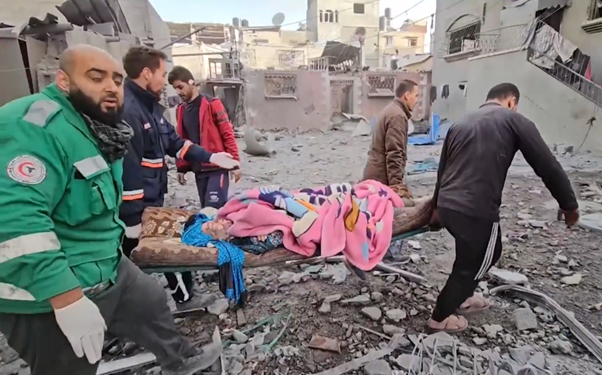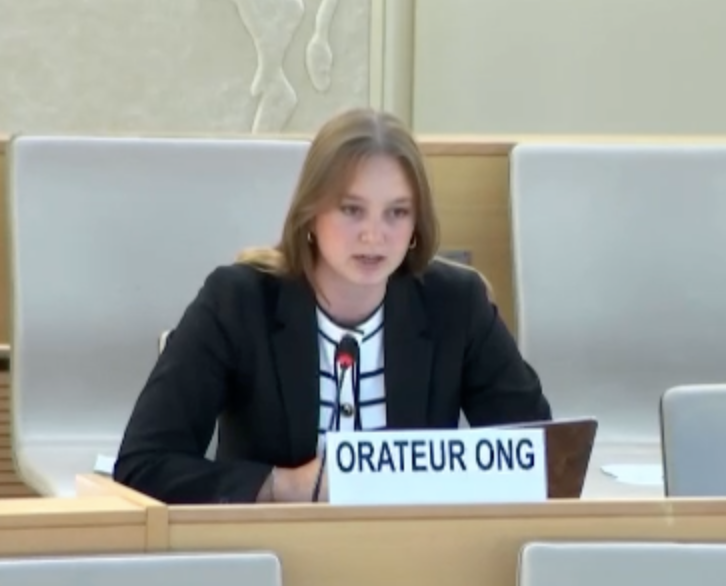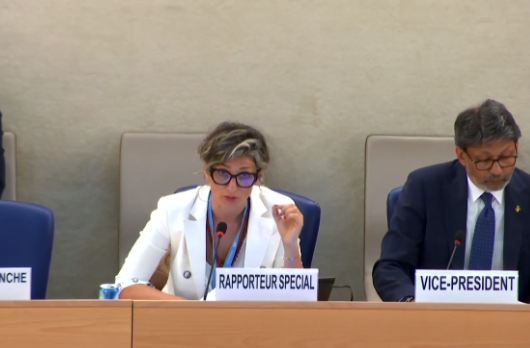
In late November 2023, as part of a now-defunct temporary humanitarian ceasefire, Israel identified 300 Palestinian women and children for potential release, who were in fact held captive under the pretext of imprisonment. During this period, National Security Minister Itamar Ben-Gvir proclaimed that "expressions of joy" by the families of the released were deemed supportive of terrorism. This policy underscored Israel's portrayal of imprisoned Palestinians as "terrorists" and the subsequent mistreatment in the form of torture of numerous detainees. Among the identified 300 individuals, 233 hadn't faced formal charges, remaining detained without clear justification; an overwhelming majority of the detainees were children, with the youngest being only 14 years of age. Administrative detention, a quasi-judicial process allowing indefinite extensions without charge or trial after an initial six-month term, is applied to the majority of Palestinian prisoners. Notably, Palestinians, including children, are often tried in military courts with limited defence and due process, in stark contrast to Israeli citizens who face civil courts.
Treatment of Palestinian Juvenile Prisoners
As reported by released Palestinian prisoners, their time in prison was marked by incidents of physical abuse and humiliation inflicted by Israeli soldiers prior to their release. Family and lawyer visits have been severely restricted or altogether suspended. This has resulted in Palestinian prisoners losing the limited privileges they had earned through years of advocacy and hunger strikes, compounded by the severe overcrowding in prisons. Reports reveal that hundreds of children, some as young as nine, have been apprehended by Israeli forces, a violation of the UN Convention on the Rights of the Child. Furthermore, children face conditions no better than adults in Israeli prisons, with documented instances of various abuses. Save the Children disclosed in a July report that 86 percent of detained children are subjected to beatings, 69 percent to strip searches, and 42 percent sustain injuries during arrests, such as gunshot wounds and broken bones. Further, some children have reported experiencing sexual violence, and others are transported between court appearances or detention centers in small cages. Palestinian children stand as the sole group globally and systemically prosecuted in military courts, with an estimated 10,000 having been held in the Israeli military detention system over the past two decades.
It is important to note that child imprisonment, as per the General Assembly resolution 45/113, should be used as a last resort, and that the juvenile justice system must uphold the rights and safety, as well as the physical and mental well-being of juveniles. Moreover, depriving a juvenile of his or her liberty should be a disposition of last resort and for the minimum necessary period and should be limited to exceptional cases.
Decades of Torture
The intensity and frequency of beatings escalated with the onset of 7th October 2023, yet historical accounts from prisoners have outlined a pervasive pattern of enduring beatings, torture, and mistreatment over decades. The practice of torture in the case of Arab prisoners in Israel can be seen in a letter dated 30th June 1977, from the Permanent Representative of the Sudan to the UN addressed to the Secretary-General, in which a five-month inquiry into Israel's occupation of the West Bank and Gaza reveals that Israeli interrogators routinely mistreated and often tortured Arab prisoners. The methods employed ranged from prolonged beatings to more severe forms of torture, such as hooding, blindfolding, hanging by wrists, sexual assault, and electric shocks. The report implicated all of Israel's intelligence services, suggesting widespread awareness of these practices. While torture is used to gather information and maintain control in occupied territories, it also serves the purpose of justifying Israel's claim of administering justice through the rule of law. Despite Israel's assertion that Arabs accused of "security offenses" receive proper trials, the investigation suggests that confessions, often obtained through ill-treatment and torture, play a significant role in convictions.
Dead Bodies of Palestinian Prisoners Held Captive in Israel
On 20th December 2023, the Palestinian Prisoners Club [PPC] has reported that Israeli authorities are currently withholding the bodies of 17 Palestinian detainees, with Anis Dawla's body being held for the longest period—over 43 years since his detention in 1980; he died during a prison hunger strike in the same year. Six prisoners who died as a result of torture after 7th October are among those whose bodies are being held. The PPC highlighted Israel's lack of transparency regarding detainees taken from Gaza, concealing information on the number of prisoners and the extent of casualties. Recent reports from Haaretz revealed that detainees from Gaza, kept at the Sde Teman army camp in Beersheba, died in custody under unclear circumstances. The total number of Palestinian detainees in Israeli jails now exceeds 7,000, with thousands being detained in the West Bank. Despite a mediated truce between Israel and Hamas in late November that led to the release of some prisoners, Israeli forces continued detaining Palestinians in the West Bank.
On the 88th day since 7th October 2023, during Israel's sustained attacks on Palestinian civilians, the figures reported by the Office for the Coordination of Humanitarian Affairs (OCHA) are stark. The toll includes 22,313 Palestinians killed, resulting in 1,838 families facing multiple fatalities – 70% of these casualties consist of 5,153 women and 7,729 children. Additionally, 57,296 individuals have been reported as injured, with the IDF’s assault on civilian areas forcing 1.9 million Palestinians into internal displacement.
In conclusion, the disheartening reality of Israel's treatment of Palestinian prisoners, particularly women, children, and juveniles, demands urgent attention and intervention. The mistreatment, torture, and lack of formal charges further underscore the need for a reevaluation of Israel's approach to justice. The stories of released prisoners, detailing physical abuse, humiliation, and restricted privileges, highlight the urgent need for reforms in the treatment of detainees. Decades of torture, as evidenced by historical accounts, paint a distressing picture of the enduring human rights abuses. Additionally, the withholding of the bodies of Palestinian detainees and the stark statistics reported by OCHA on the 82nd day of IDF’s assault emphasise the magnitude of the ongoing humanitarian crisis, necessitating immediate global attention and action to address the plight of the people of Gaza.
Geneva International Centre for Justice (GICJ) vehemently condemns Israel's treatment of Palestinian prisoners, particularly women, children, and juveniles. GICJ expresses deep concern over the unjust imprisonment of Palestinians, the majority of whom faced no formal charges, and criticises the use of administrative detention, military trials, and the portrayal of all detainees as "terrorists." GICJ condemns the decades-long pattern of torture, challenges Israel's claim of administering justice, and urgently calls for global intervention to address the humanitarian crisis, emphasizing the need for reforms and immediate attention to the plight of the people of Gaza.
Read more from GICJ:
|
75 Days and 75 Years of Ethnic Cleansing, war crimes and massacres |
|
HRC53: "Israel transformed the OPT into a constantly open-air prison" |
For more information:
https://www.ohchr.org/en/instruments-mechanisms/instruments/united-nations-rules-protection-juveniles-deprived-their-liberty
https://www.ochaopt.org/content/hostilities-gaza-strip-and-israel-reported-impact-day-88
https://www.un.org/unispal/document/auto-insert-187447/







